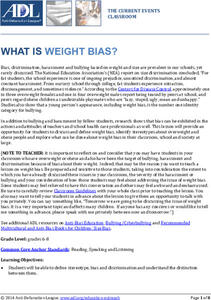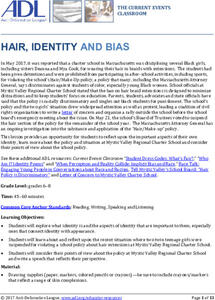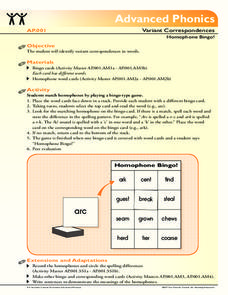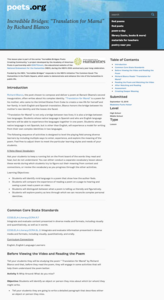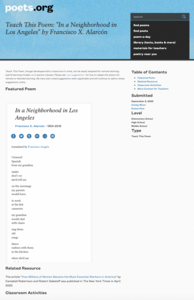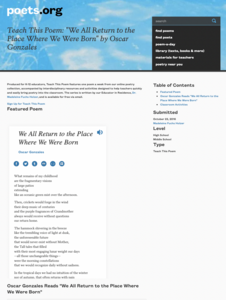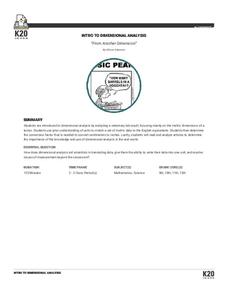John F. Kennedy Center
Comparing Cultural Holidays
A lesson examines the holidays, Día de los Muertos and Halloween. After an exciting clip from the movie Coco, class members review vocabulary and discuss what they know about Halloween. The conversation leads into the history of Día de...
National Endowment for the Humanities
Frances Ellen Watkins Harper’s “Learning to Read”
Frances Ellen Watkins Harper's poem "Learning to Read" is the focus of a lesson plan that teaches middle schoolers how to do a close reading of a text. The lesson plan introduces them to a brief biography of the poet, includes a video...
Anti-Defamation League
Dealing with the Social Pressures that Promote Online Cruelty
Why do people engage in cyberbullying? What can be done about it? These are the questions middle schoolers consider in a very timely lesson. Participants view PSA announcements, read a case study, and participate in scenarios designed to...
Learning for Justice
Cliques in Schools
Band geeks, jocks, preppies; every school has its groups. Middle and high schoolers identify the various friendship groups and cliques in their school and consider these groups' positive and negative traits. After completing a Clique...
Anti-Defamation League
What Is Weight Bias?
After setting rules and expectations to create a safe place to share thoughts and feelings, scholars define the terms; stereotype, basis, and discrimination. Using a web brainstorm, learners list words associated with overweight and...
Learning for Justice
Looking Closely at Ourselves
A thoughtful discussion about self-reflecting leads to a conversation about skin color and making a list of words associated with "beauty." Budding artists use a mirror to examine their features and create a self-portrait. Peers critique...
Anti-Defamation League
Don't Let Hate Ruin the Fun: Youth and Online Games
Gamers unite! Take action against bullying and hate speech in online video games! After reading data that reveals the extent to which various age groups experience hate and, or harassment while playing video games online, groups develop...
Anti-Defamation League
Hair, Identity and Bias
Middle schoolers weigh in on dress codes, specifically those that apply to hair and make-up, with a instructional activity that uses a 2017 case from a charter school in Massachusetts. Class members read about two girls suspended for...
Anti-Defamation League
Hair Discrimination and the CROWN Act
The CROWN Act (Creating a Respectful and Open World for Natural Hair) is the subject of the lesson that asks groups to research the stories of five different women and share their insights in a jigsaw activity. Participants then craft...
Florida Center for Reading Research
Advanced Phonics: Variant Correspondences, Homophone Bingo!
Phonics doesn't just have to be a daily routine for class members. Spruce up their phonemic awareness with an exciting game of Bingo! Young grammarians select cards, locate their matching homophones, spell the pairs, and identify how...
Learning for Justice
Recognizing Discrimination
Empower scholars to take a peaceful stand against discrimination. The color of their clothes separates learners; then, only some are allowed to go to recess—this sparks a discussion about the concept of discrimination and how they felt...
Anti-Defamation League
Building a Foundation for Safe and Kind Online Communication
Put a spotlight on internet safety with a lesson designed to boost positive online communication. Scholars listen to the story, Yettele's Feathers by Joan Rothenberg, and answer questions. An emoji-themed handout challenges pupils to...
Learning for Justice
What is Empathy?
Young scholars examine facial expressions to identify emotions, listen carefully to stories, and choose the appropriate reaction. Partners choose one story to rewrite, showing empathy for others.
Teaching for Change
Latino/Hispanic Heritage Resource Packet
Here's a must-have resource for Latino/Hispanic heritage month, September 15 through October 15. The 18-page packet includes suggestions to guide your planning, quizzes to test knowledge of heritage facts and immigration myths, and...
Academy of American Poets
On "El Florida Room" by Richard Blanco
Scholars of all ages examine Richard Blanco's poem, "El Florida Room." Looking closely at pictures, pupils look for details that stand out to them, then read the poem. A whole-class discussion allows learners to reflect on what they...
Academy of American Poets
Teach This Poem: "When Giving Is All We Have" by Alberto Ríos
What makes giving meaningful? Class members discuss this question, then listen to Alberto Rios reading his poem, "When Giving Is All We Have." Finally, the class considers what the poet says about the question.
Academy of American Poets
Incredible Bridges: “Translation for Mamá” by Richard Blanco
Who or what do you miss? That's the question that launches an activity that asks writers to craft a paragraph filled with sensory details that shows how they feel. Next, they listen to Richard Blanco reading his poem, "Translation for...
Academy of American Poets
Teach This Poem: "When There Were Ghosts" by Alberto Ríos
Before cell phones, tablets, and computers with access to YouTube, before gleaming multiplexes and even before television, there were small theaters with Saturday night black and white movies. Alberto Ríos's poem "When There Were Ghosts"...
Anti-Defamation League
Who Was César Chávez?
Scholars complete a KWL chart to indicate what they know about Cesar Chavez and then research what they want to know about this farm worker, labor leader, and civil rights activist. To complete the lesson, scholars research modern civil...
National Endowment for the Humanities
"Sí, se puede!": Chávez, Huerta, and the UFW
"Sí, se puede!" Cesar Chavez and Dolores Huerta believed organizing farm workers and changing their working conditions were possible. Scholars examine provisions of the Bracero Program, videos, and the United Farm Workers' (UFW) work....
Academy of American Poets
Teach This Poem: "In a Neighborhood in Los Angeles" by Francisco X. Alarcón
After sketching an essential person and reading an article, scholars read the poem "In a Neighborhood in Los Angeles" by Francisco X. Alarcón. They listen to the poem in English and Spanish and record lines that stand out to them. Small...
Academy of American Poets
Teach This Poem: "We All Return to the Place Where We Were Born" by Oscar Gonzales
What do you remember about your childhood home? Scholars listen to Oscar Gonzales reading his poem "We All Return to the Place Where We Were Born" in Spanish and English, then discuss what they learned about Gonzales.
Academy of American Poets
Teach This Poem: "The Snowfall Is So Silent" by Miguel de Unamuno
Cold, beautiful, unique! Class members closely examine John Singer Sargent's watercolor "Snow," taking note of the artist's techniques, and pair up to discuss how the image makes them feel about snow. They then repeat the process with...
K20 LEARN
From Another Dimension: Intro To Dimensional Analysis
Hold measurements to a different metric. Class members convert the measurements of a dog's tumor to explain the size to its owner. Using cards, learners match metric measurements with their English equivalents. They then read articles to...






